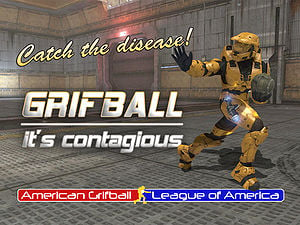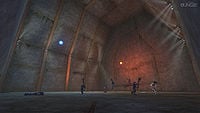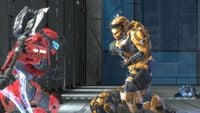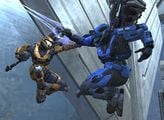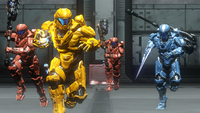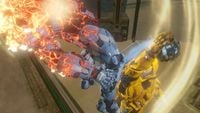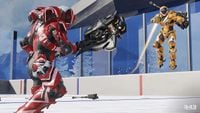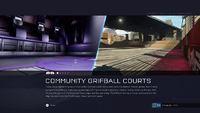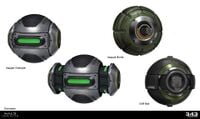Grifball
From Halopedia, the Halo wiki
| This article does not meet the wiki's general standards and/or standards on layouts. You can help by cleaning this article. |
| “ | In 2554, the Red Army introduced Grifball to the world. By 2557, all other sports had been abandoned. | ” |
Grifball is a community-created gametype made by Burnie Burns of Rooster Teeth. It was introduced as a custom game type in Halo 3, subsequently introduced in matchmaking, and was made a permanent game type in Halo: Reach, Halo 4 and Halo 5: Guardians. In Halo 3 and Halo: Reach, the game is an Assault variant, while in Halo 4 it is a variant of Oddball.
General features[edit]
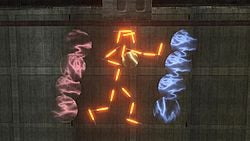
The game is played like a Rooster Teeth-inspired game of Rugby. Red and blue teams, both with three to four players, square off in a simple arena in which each team has a goal. The object is to take the ball in the middle of the court and put it in the other team’s goal. Irrespective of the team, the ball carrier's armor color always changes to orange when they are carrying the ball.
Scoring a goal earns one point. In Halo 3, Halo: Reach and Grifball Pro of Halo 4, this also ends the round. In Halo 3, each match consists of 5 rounds (originally 9 rounds). Halo: Reach and Grifball Pro in Halo 4 have up to five rounds with three victories to win, and unlike Halo 3, the game will end after the third victory. There is a three minute time limit for each round. Grifball in Halo 4 and Halo 5: Guardians uses a single round.
Grifball games are typically played on open rectangular courts that do not have any obstacles; the only frequently available features of the levels are subtle narrow ledges at the edge of the court that often require Gravity Hammer-boosted jumping to utilise. Despite of that, the game becomes extremely intense and strategic as the game relies heavily on teamwork and a bit of luck.
Each player has a Gravity Hammer and an Energy Sword (secondary), with infinite energy for both weapons. In some maps and game variants in Halo 3 and Halo: Reach, the 7 wood is used instead of the Gravity Hammer, though the gameplay remains identical. In Halo: Reach and Halo 4, there are two loadouts available: one has Gravity Hammer and Energy Sword, and the other has Energy Sword and Gravity Hammer. The purpose of this is to let the player pick their spawn weapon, as this can be crucial when respawning.
The game features very fast respawning, short distances, no places to hide, and often results in players getting several multi-kills up to Killionaires and occasionally an Extermination (usually due to exploding Bombs). A well-timed Gravity Hammer strike during the start-of-round "bomb rush" can also claim four—or seven, for that matter—lives at once. Skilled players can accrue very long killing sprees.
Damage is set to 200% with player health set to 10%. One direct hit will kill a player. Dead players respawn in three seconds at their own goal.
The ball carrier has a 2× Overshield, 150% speed, 150% damage resistance after a period of time in which these charge up. The ball carrier also turns orange, like the character Dexter Grif from the webseries Red vs Blue, for whom the game is named. Shield recharge speed has been increased since the inception. In some of the early Double EXP Weekends, Bungie made the mistake of making the bomb carrier become gold instead of orange, resulting in the ball carrier being colored like Grif's sister, Kakaina Grif. This was corrected in subsequent updates.
Friendly players can hurt and betray each other, making use of the motion tracker encouraged. As accidents frequently happen, betrayal booting is disabled.
Origin[edit]
The origin of Grifball can be traced back to an interview with its creator:
"In Season Four of Red vs Blue, Sarge is taking pot-shots with a Sniper Rifle at Grif, whom he hates. He’s having a great time and blurts out 'This is the best game since Grifball!' That was written about three years ago and we always wondered what kind of game Grifball would have been. That’s why the ball carrier turns orange – everyone in the game is constantly trying to hammer-smash Grif and even if he scores, he explodes. Either way, Sarge wins."
While the first off-hand joke about "Grifball" was made in Season 4 of Red vs. Blue, the actual practical development of the gametype only started three years later when Rooster Teeth was making the Heroic Map Pack "D.I.Y." trailer and experimenting with Forge and custom Assault game types in the Foundry map.[1]
There have been two documented occasions in Halo 3 (Grifball Week 2 Highlights and British Summer League Highlights Week 3) when the ball-carrier (A.K.A. Grif) did not die after scoring. In the first case, he dropped the Bomb and rode a Hammer shock wave away from the explosion to safety. When the video ends, Sarge is heard crying in the background, "I'm so sad, I don't think I can go on. End it now, end it now." The second time this happened, the player managed to score and was then propelled out of the way by an opponent in an attempt to kill him.[2] After Halo: Reach's release, ball-carriers escaping the explosion became more common thanks to the inclusion of Armor Abilities such as Sprint allowing them to get away in time. This is often remedied, though, by changing the game settings so that the ball-carrier will automatically drop dead upon scoring.
A basic instructions video is shown on YouTube.[3]
Installment changes[edit]
Halo 3[edit]
Originally, Halo 3 Grifball was played on Forged custom maps based on Foundry and Sandbox's Crypt area.
Grifball appeared many times in Halo 3 unranked Double EXP Weekend hoppers, since March 6 [which year?]. There was no set rotation for Grifball, although it has appeared many times.
In the unlikely event that a player finds themselves thrown outside the arena (beyond the wall), teleporters situated beyond the playing field have been provided. These teleporters will drop you outside the map, killing you instantly. You will respawn back at your goal. Play is not suspended when a player goes out of bounds. It is the player's duty to return to play. If a ball carrier goes out of bounds, they must return to play within 30 seconds (judged by time on Save Film) or they forfeit the entire match. If they leave the ball beyond the wall, it will reset within 15 seconds. Play is not suspended while the ball or ball carrier is out of bounds. (Halo: Reach and Halo 4 employ kill boundaries to limit the player movement and allow ball respawning.)
The original Grifball courts were Foundry variants. During the development of Mythic Map Pack, one of the ideas behind Sandbox's Crypt area was to use it as a Grifball court, resulting in the Grifball map variant Grifbox and subsequent player-created Grifball maps. The tradition to put special areas in Forge canvas maps continued in Halo: Reach and Halo 4.
Originally, Halo 3 matchmaking had only one map available in Double EXP Weekends, such as "AGLA FL09" or "AGLA Foundry". As there were no game variants available, vetoing was disabled on Grifball playlist. As more maps were introduced, vetoing was enabled. Some of the new player-created variants were Mayan Grifball, Grifballupthere, and Aerial Grifball.
Halo: Reach[edit]
In Halo: Reach, Grifball became an official gametype with its own icon and announcer line. It has been given a permanent playlist.
Variants:
- regular Grifball
- Grifball Evolved, Grifball Dash: Features Evade and Sprint armour abilities, respectively.
- Blargball, Zealot Blargball: Players are Elites, and the games are often played on differently-oriented courts as well.
- Jetpack Grifball, Jump Pack Grifball: Players have jetpacks (often with endless boost) and the goals are high above the ground.
- Hand Egg: The players have 7 wood instead of Gravity Hammers and the game features a golf ball. The bomb will unspawn when not carried, and respawns at the location of the golf ball, so part of the strategy is to get the golf ball to an advantageous location.
All maps are based off locations inside Forge World, often in the "Coliseum" region, which got one of its inspirations from Grifball.
Halo 4[edit]
Halo 4 Grifball matchmaking playlist was launched January 28, 2013. As Halo 4 doesn't feature Assault, the ball has been replaced with the Oddball skull, is affected by physics (such as Gravity Hammer blows), and doesn't explode at the end of the round. After a later playlist update, the goals now also emit energy bursts reminiscent of the traditional explosions when a goal is scored.
There are two primary variants of Grifball in Halo 4 matchmaking. Grifball Pro is similar to the earlier incarnations in that ball must be picked up with the X button and the game is divided into distinct rounds. Grifball doesn't feature distinct rounds, but instead the ball will respawn in the middle of the court after a short delay.
The various Matchmaking Grifball map variants are based on Erosion, Impact and Ravine, the three Forge canvas maps shipped with Halo 4. The built-in Grifball Court map is based on Erosion.
In March 17, 2013, the playlist had an update in honor of St. Patrick's Day in which the ball carrier turned green instead of yellow.
Halo 5: Guardians[edit]
The Halo 5: Guardians version of Grifball was introduced as part of the Hammer Storm update of February 24, 2016. It builds upon a new generic "ball game mode" used to create various gametypes like Grifball, Assault, Oddball and Ricochet. The default Grifball Court map was the first to be released as part of Hammer Storm.
Players are now launched to the field with man cannons similar to the Breakout round start, and goal explosions now feature fireworks; much like Halo 4 variant, the explosions aren't particularly lethal. The gameplay is similar to the default Halo 4 incarnation with single round and respawning ball, except the ball must be picked up with X button (as in earlier games and in Halo 4 Grifball Pro). The new movement options of Halo 5: Guardians also have an effect on gameplay: the railings surrounding the maps, which were previously only accessible by careful Gravity Hammer boosting by other players, can now be clambered on. Ground pound can also be effective, especially when carrying the ball; a well-targeted ground pound can both clear the surroundings of the goal and score at the same time. The game also features new Grifball medals. As Halo 5: Guardians doesn't have loadouts, players always spawn with Energy Sword as the primary weapon and Gravity Hammer as secondary weapon.
Tips & Tactics[edit]
On the following table, the normal writing is what you are holding, the bold writing is what your opponent has.
| Bomb | Energy Sword | Gravity Hammer | |
|---|---|---|---|
| Bomb | N/A | Try to punch the sword wielder as he lunges or before he lunges. Timing is key. In Halo: Reach, you will just barely survive if your melee kills them as they lunge. | You should be able to punch them unless you're low on both shields and health. This is known as a "God Punch". |
| Energy Sword | The Lunge nearly always works. They will survive if they have full health and shields and they melee you as well, however. | If you both sword parry, you should melee, instead of slicing the second time, as it is faster. Note that parrying is impossible in Halo: Reach due to the parry doing damage to health.
OR Melee first to parry the Lunge, then Melee again to kill. Once again this only works in Halo 3. |
Back out of range as they hit then rush and lunge at them. |
| Gravity Hammer | Try to swing as he is about to punch you. This should cause him to stop mid ball lunge and/or propel him backwards. |
Rush and attack at the right time. OR Time it so that you can get a bulltrue |
Back up to avoid the splash damage, then move forward after he has made his Hammer strike.
OR Strike when you are about a meter and a half away from the enemy. |
- A common and sometimes effective tactic is to jump above your enemies during the inital rush for the bomb and hammer them. You have to time it just right or they will most likely hit you first. This technique often results in betrayals but if done right will kill the opposing rushers and get you the bomb.
- A good counter against 'Grif' (the bomb carrier) is to jump above him and slash with the sword.Only experienced bomb carriers will counter this as most are looking forward and not up.
- When holding the Gravity Hammer, if you wish to head towards the enemy's spawn area, face the wall behind where your team spawns, and repeatedly slam the hammer down and jump whilst facing the floor while moving backwards. This is an excellent way to speed toward the bomb, or enemies bomb drop. However, it leaves you exposed to an enemy's attack.
- When using the sword against the Gravity Hammer (this is ill advised if you are unskilled) wait for them to swing, and while their hammer is still down, get close and lunge. This takes some practice, but it is an effective way of racking up kills with the sword.
- Don't stick together; the enemies will just get a multi kills with one hit or two, or you may betray each other due to the splash damage. Instead, spread out and take every direction so it's one on one.
- Keep the enemy at a distance, lest they rush in and score. Remeber to always keep your goal protected.
- You do not need the full nine (five in matchmaking), just attempt to get five (three in matchmaking) scores. If you have the ball and full over shields, you can "wave ride" as it is commonly called by jumping over a player, on the other team or yours, and at the cost of your shield you can be flung across the map. Sometimes you will just be propelled upwards but, using this tactic you can go from your side of the field to the goal. It is possible to wave ride multiple times if you are in the air long enough to let your shields recharge. Using the Sword against the ball carrier can be more useful than the Hammer because of having no possible way of wave riding.
- You don't need to wait for the reticle to turn red to swing in Grifball. Swinging just before it turns red will still get you a kill because of the lack of shields when not holding the ball.
- At the beginning of a round, don't rush the bomb with everyone else on your team. Instead, stay off to the side of the bomb. That way, you can grab the bomb almost unchallenged after most people are dead after the opening rush, or run to their spawn area as they spawn.
- If you’re feeling lucky, try a couple of twists or sharp turns to trick the other team.
- A recent technique that appeared in a Grifball Tournament was known as "wall jumping". In which the ball carrier would jump on the small ledge behind the goal before scoring in order to evade pursuers.
- Another way to score is to wait about 3 steps behind your team at the very beginning. Usually, most of your team, and your opponents, will perish in the beginning rush. Once that is over, grab the bomb and punch the few remaining players on the opposite team (if an opposing team members lunges towards you with an energy sword and you punch them usually you will lose your shield and the opponent will die) and before they have a chance to respawn, you will have scored. (Note: this does not work as well with experienced players on the other team as they also usually wait a bit back as well.)
- Try to figure out who the host of the match is. If you have the ball, and are being ran at by the host, you will have to punch earlier then you would if you were facing a non-host.
- If you are not careful you can cause many betrayals with the Gravity Hammer. Be sure to watch where you swing, especially during the initial rush for the bomb.
Launches[edit]
Launches are a way of propelling your teammates forward quickly.
- Starting launches- Launches performed at the beginning of a round to send your teammates to the ball quickly.
- Inside/ Outside- In this launch, the two on the outside swing their hammers, as the two that spawn on the inside jump forward, propelling the two on the inside straight to the ball.
- Spawn Bonk- In this launch, you will have to remember a number system. When you spawn, the guy on the farthest left is #1. The next guy to his right is #2. To his right, #3. And the guy farthest to the right is #4. #1 will simply run forward with a sword, as defense, in case you don't get the ball. #3 will jump forward, as #2 and #4 swing their hammers to launch him to the ball.
- Ball Carrier Launches- These launches will help launch your ball carrier so that he can score quicker.
- Primary Launch- This is the most common launch for an actual match. The launcher faces sideways, and the ball carrier runs directly in front of them. As the ball carrier passes the launcher, they should jump forward, and the launcher should swing their hammers. This launch can also be done with two launchers, where the launchers are facing each other, and the ball carrier runs in between them.
- Shotgun or Snake in the Grass- In this launch, the launcher will face towards the ball carrier. The ball carrier will run straight towards him, and the launcher should jump over his head. As the ball carrier passes under the launcher, the ball carrier should jump forward, and the launcher should swing their hammer.
- Mario- The launcher faces away from the ball carrier. The ball carrier should jump and land on the launcher's head, then jump forward again. At this point, the launcher should swing their hammer.
- Two Launcher Weave- Two launchers will face towards where they are launching the ball carrier (away from the ball carrier), in a line. The ball carrier will weave in between them and jump forward as he passes the launcher closest to the score. At this point, the front launcher should swing their hammer, and the back launcher should swing immediately afterward.
- Lone launches- These launches can be performed when you don't have a teammate near you to launch you.
- Flowers- This is a launch to be performed as you pick up the ball. Perform a hammer jump, while holding the button to pick up the ball. This will send you flying way up into the air, and anyone can swing their hammers from anywhere on the court to try to propel you. NOTE: This can be performed if you are host of the match, but it is much harder to do.
- Hammer Propulsion- A very simple, fairly obvious launch. Just face away from the direction you want to launch, jump backwards, and swing your hammer.
Trivia[edit]
- The original name Grifball was going to be "Halo Rugby" but was later changed when Gustavo Sorola thought the original title was weak.[citation needed]
- The Blargball variant of Grifball is a reference to the only word Elites in Red vs Blue say, aside from occasional grunts and honks.
- McFarlane Toys produced a Grifball action figure in orange Recon armor. This was also the first ever action figure made based on Rooster Teeth productions.[1]
- On October 27, 2012, Achievement Hunter released a Minecraft Let's Play which featured them (including Geoff Ramsey, the voice of Grif) playing Grifball on a map made by AxialMatt.
- Grifball was intended to be part of Halo 2: Anniversary, but the gametype never made it into the game.
- There is, however, a variant of Ricochet that does play somewhat like Grifball. In this variant, both teams only have Energy Swords; this is because no Gravity Hammer or 7-Wood exists in Halo 2: Anniversary. This Grifball variant is played on square maps just like other Grifball interpretations.
Gallery[edit]
Spartan-IIs and Sangheili playing Grifball in Halo 3.
Spartan-IIIs playing Grifball in Halo: Reach.
Spartan-IVs playing Grifball in Halo 4.
"Grif" assassinating an enemy Spartan in Halo 4.
Concept art of the ball for Halo Infinite (bottom right).
Sources[edit]
- ^ Jump up to: a b Halo Waypoint: Behind the Scenes: Rooster Teeth
- ^ http://www.youtube.com/watch?v=I2m5fYEAHYE
- ^ http://www.youtube.com/watch?v=rmOzAE-CbLY
Related links[edit]
Internal[edit]
External[edit]
- Rooster Teeth's Grifball thread
- American Grifball League of America
- National Grifball Association
- GrifballHUB
| |||||||||||

